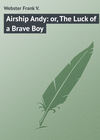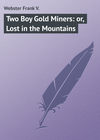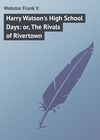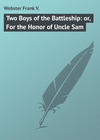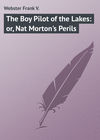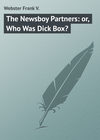Kitabı oku: «Airship Andy: or, The Luck of a Brave Boy», sayfa 8
CHAPTER XXII – “GO!”
“Andy!” shouted John Parks in a transport of amazement.
“It’s me,” panted Andy, running up to his employer and pointing at Tyrrell. “Mr. Parks, stop that man. He’s a traitor; he’s a villain!”
Tyrrell had heard and seen Andy. He gave a great start. Then he made a move as if to hasten aboard the airship and get out of his way. Mr. Morse and the Japanese hastened forward. The men guiding the aeroplane stared hard at the newcomer.
“Andy, what do you mean?” demanded Mr. Parks, lost in wonderment.
“Just what I say. Don’t let him get aboard.”
“Hold on, Tyrrell,” ordered the aeronaut.
“We’ll lose the start,” spoke Tyrrell hurriedly.
“Don’t you get aboard.”
“No, sah; yo’ just obey Mistah Parks, suh,” interposed Scipio, laying a great hindering hand on the arm of Tyrrell.
“I have been a prisoner in the Duske camp since yesterday,” explained Andy, catching his breath. “This man Tyrrell came there last night. He is in the employ of Duske.”
“What!” shouted Parks, his face growing dark.
“It’s true, Mr. Parks,” asseverated Andy. “They are in a plot to burn the Racing Star and have you lose the prize.”
“Do you hear what this boy says?” thundered the aeronaut, moving down on Tyrrell with threatening mien.
“It’s – it’s not true,” declared Tyrrell, but turning pale, shrinking back, and looking about him for a chance to run.
“If you don’t believe me,” cried Andy, “search him.”
Scipio held Tyrrell’s arm in a viselike clasp. Parks ran his hand over his clothing. He drew from his pocket a parcel done up in a handkerchief. Mr. Morse took it, opened it, and revealed a bottle filled with some substance like kerosene, a small box of matches and some lint. Quick as a flash the hand of the aeronaut shot out for the throat of Tyrrell.
“You treacherous scoundrel!” he shouted.
Boom!
“The third gun! They’re off, Mr. Parks,” cried Andy. “Oh, don’t let the Racing Star miss it.”
“What can I do?”
“Send me. Men, get ready. Mr. Parks, I’ll win this race!”
Andy was in no trim physically or in attire to attempt the race. At a glance the aeronaut saw this. But our hero was irresistible. He ran towards the machine, and with nimble movements he glided among the planes and reached the operator’s seat. Already the other airships were sailing skywards.
“Go!” shouted Andy.
Upon the operator’s seat lay the skull cap and goggles, ready for Tyrrell, and Andy hastily donned them. He heard the voice of Parks, now as excited as himself, giving orders, a tacit consent to make the start.
There was a run of scarcely a hundred feet along the grass. Andy placed a firm hand on the wheel. Then came a series of curves and sweeping arcs, which kept the crowd of spectators turning first one way and then the other in entranced silence.
The young aviator followed the popping of the motors of the contestant machines. One was fast becoming a mere speck in the sky.
“The Moon Bird, Duske’s machine,” murmured Andy.
It seemed poised in the air without motion, so direct was its course, so true its mechanism. Two of the other airships had already descended, one of them wrecked and out of the race. The forty-foot mechanical bird, the Duske machine, however, had made the lead and kept it.
The climax came in Andy’s preliminary ascent. Now the Racing Star, light and dainty as a lark, mounted with amazing speed. A glance at three of the airships convinced Andy that they were too faulty to make a record. The Moon Bird, however, was a marvel. From what he had heard Mr. Parks say, Duske had been an expert balloonist, and he now showed amazing ability in the aviation line. He seemed to be putting the stolen airship idea to marked advantage.
Andy struck a level about fifteen hundred feet in the air. There was a head wind, but it was not strong. Andy put on fine speed gradually. The Racing Star passed two of the contestants, and, fully in action, he drove keen on the trail of the Moon Bird.
The train that acted as a pilot with an American flag on its last car, Andy kept in view as a guide. When they came to Lake Clear, the Moon Bird did not follow the rounding land course, nor did Andy. Lake Clear was a shallow body of water, but of considerable extent, and dotted here and there with little islands.
Suddenly the Moon Bird, a machine of good utility, but, as Andy knew, of little lasting power, made a decided spurt, passed the Racing Star, and at a distance of half a mile got fairly abreast of the lake. It was here that Duske met his Waterloo. Hitherto he had maintained practically a steady course. More than once Andy had got near enough to this rival to hear the loud gasping of the tube exhausts drown out the sharp chug-chug of the motor. Suddenly Duske made a sharp turn.
An appalling climax followed. In consternation and suspense Andy watched aerial evolutions that fairly dizzied him.
“He is lost!” breathed Andy, a-thrill.
In an instant he recalled what Mr. Morse had told him of the unfinished model that Duske and his crowd had stolen from him. The inventor had explained to Andy that while the suction principle involved in the rudder construction was unique and bound to increase speed, there should have been added automatic caps to close the rear ends of the suction tubes where a curve was attempted.
Of this Duske evidently knew nothing. The moment he turned the machine, however, there was a whirl. The aeroplane described a dive, then a somersault. Its lateral planes collapsed, and, tipping from side to side, it began to descend with frightful velocity.
Once it half righted, balanced, went over again, and, fifty feet from the ground, shot clear of a little islet, and went down in the water of the lake, a wreck, first spilling Duske out.
“He is killed or stunned!” exclaimed Andy.
The boy aviator saw the other airships forging ahead, indifferent to the accident. Minutes counted in the sixty-mile race to Springfield and back to the starting point, but Andy was humane. He saw clearly that, if alive, the half-submerged Duske would be suffocated in a few minutes’ time.
“I can’t leave him to die,” murmured Andy, and sent the Racing Star on a sharp slant, landing on the island.
Andy was soon out of the airship. He waded to the spot where Duske lay, and dragged him bodily up on dry land. As he turned him on his face, Andy knew from its purple hue, the lifeless limbs and choked gasps of the man, that another minute in the water would have been his last.
A boat put out from the mainland where a crowd of spectators was watching the race. Four men jumped out as the island was reached.
“Take care of this man,” ordered Andy.
“You’re a pretty fair fellow to risk losing the race to save a competitor,” spoke one of the men heartily.
He and his companions followed Andy’s instructions the best they could in starting the Racing Star, and Andy shot skywards again, making up for lost time.
CHAPTER XXIII – THE GREAT RACE
“Hurrah!”
“Why, it’s only a boy!”
“Parks’ man – get your rest, lad, while we see to things.”
Andy found himself in a whirl of motion and excitement. When he had left the island where he had sacrificed his time and risked his chances of winning the race, he had discovered that he was fourth on the programme. The Flash was becoming a distant speck, and the two other contesting biplanes were lagging after the leader.
Andy now set a pace to force the Racing Star to do its utmost. His good knowledge of detail as to the machinery and his masterly manipulation of the same soon brought results. The Racing Star easily passed two of the airships ahead. Then Andy ran neck-and-neck with the pilot train for several miles.
The Flash, however, kept up admirable speed, but finally a wing broke or oil ran out at Wayne, and the operator descended to a relief station.
Now was Andy’s chance, and he made the most of it. With those inspiriting shouts of “Hurrah! Why, it’s only a boy!” and the announcement from the relay posted at Springfield by Parks that they were on hand to tank up the Racing Star and adjust the machinery, Andy landed at the outskirts of the city, just half the race distance covered.
It made him quite dizzy-headed to sail down along a vast sea of human beings, wild with enthusiasm at greeting the leader so far in the race.
Two men took entire charge of the Racing Star, with quick movements, tanking, oiling the cylinders, testing every part of it. A third man brought Andy a tray containing a cup of steaming coffee, one of beef tea, and some crackers.
“There she comes!”
“Hurrah No. 2!”
“The Flash!”
“And there she goes!”
“All aboard, Parks,” sang out the leader of the relay gang, and with a glide and a whiz the Racing Star was once more up in the air.
Again the Flash was in the lead. Having been supplied with fuel and oil at its recent stop, the operator did not make any halt at the turning post. Andy felt fresh and ambitious, and the Racing Star responded loyally to every touch of wheel and lever.
Fifty feet from the ground a wheel dropped from place, but Andy paid no attention to this. The train did not act as pilot on the return trip. Instead, at intervals of five miles to indicate stations, smudges were being sent aloft. Andy made a direct run for the first one of these, mapping out his route from those dimly visible on the course ahead.
At Dover Andy passed the Flash. For the next five miles they kept pretty well abreast.
The last smudge was about eight miles from Montrose. Andy flew past it making a circular turn as he plainly made out the aviation field in the distance. His competitor made a short cut, lost on a turn to strike the straight course and Andy overtook him.
Now it was that Andy tensioned up the splendid machine to its highest power. The white expanse of canvas and wood shivered and trembled under an unusual strain.
“In the lead!” cried Andy in delight, and his eyes sparkled through the goggles as he took a swift backward glance. The Flash was bungling. Its progress was a wobble and its operator was at fault in striking an even balance.
The speed of the Racing Star had now been increased to its utmost.
“Five minutes more, six at the most, will decide the race,” breathed Andy. “I can’t lose now.”
The Racing Star was no longer a bird afloat, but an arrow. Giving to the machine a certain slant, calculating to a foot how and where he would land, Andy saw nothing, thought of nothing, but the home post.
He was conscious of a frightful bolt downwards that fairly took his breath away. There was a blur of flying fences, buildings, tents, a green expanse, a sea of human faces, a roar as a great shout went up, and the Racing Star met the ground on a bounce, and Andy Nelson was the winner of the great race.
Our hero did not step from the airship as eager, willing hands eased the Racing Star down to a stop. Cheering, excited men fairly pulled him over the drooping planes. Some one hugged him with a ringing yell of delight, and John Parks’ voice sounded in his ears.
“Oh, you famous boy – Andy, my lad, it’s the proudest moment of my life!”
Mr. Morse caught Andy’s hand, his serious face flushed with pride.
“The Racing Star did it,” said Andy.
“Yo’ did it, chile, and yo’ did it brown,” chimed in Scipio, his mouth expanded in joyous delight from ear to ear.
John Parks never let go of Andy’s arm as they made their way through the crowds to the main aerodrome stand. The official starter had unscrewed the speedometer and elevation gauge. He ran before them to the stand. Someone quickly chalked a legend on the big, bare blackboard. It ran:
Start of flight – 10:04.
Finish – 11:39.
Distance traveled – 60 miles.
Maximum height – 1,200 feet.
Wind velocity – 12 miles from the west.
Winner – Racing Star.
Operator – Andy Nelson.
Somehow the boy aviator thrilled as he read his name at the bottom of the little legend.
“It’s like a dream, Mr. Parks – just like a dream,” and his voice was faint and dreamy in itself.
“Don’t collapse, lad,” directed the aeronaut anxiously – “the best is to come.”
“It’s only the reaction,” said Andy. “To think I did it – me, only Andy!”
“There isn’t another Andy like you in the whole world,” enthusiastically declared Parks. “Yes, sir,” as a man waved to him from the table on the grand stand.
“Here’s the check, Parks,” notified the judge.
“Well, we’ve won it, haven’t we?” chuckled the aeronaut.
“You have, and it’s ready for you. A pretty piece of paper, hey – five thousand dollars. Make it out to you?”
“I’ll take it in two checks,” answered Parks.
“Mr. Parks – ” began Andy.
“There’s only one check for the whole amount,” replied the judge, “and only the name left to be filled in.”
“Oh, that’s the way of it, eh?” said the aeronaut. “All right, fill it in John Parks and Andy Nelson. I reckon, Andy, I can’t get that twenty-five hundred dollars away from you without your signature.”
He poked Andy in the ribs in jolly fun. He was all smiles and laughter as he shouted an order to Scipio to hurry home and get up the best celebration dinner he knew how. Then, Andy following him, he stepped forward to take the arm of Mr. Morse, and thus, the Japanese walking with Andy and congratulating him on his great feat, they crossed the field away from the crowds.
Some one broke over the dead line ropes and made a dash after them, yelling loudly:
“Andy, oh, Andy Nelson!”
“Hold on there!” ordered an officer, trying to head off the trespasser.
“Silas Pierce!” exclaimed Andy.
“He goes with us, officer,” called out Parks. “You bet you go with us, you grand old hero!” he cried, giving the farmer boy a joyful, friendly slap on the shoulder.
“Yes, indeed,” smiled Andy, catching the arm of Silas and hugging it quite, “if it hadn’t been for you, there would have been no race.”
“Andy,” gasped Silas, “I can hardly believe it. Why you’re famous.”
“Am I?” smiled Andy.
“And rich.”
“Rich in good friends, anyway,” replied Andy.
“I hung around. When I saw you coming in on the lead, I nearly fell flat I was so excited,” declared Silas.
“I want a chance for a little talk with you, Silas,” said Andy. “I want to show you how much I appreciate what you have done for me.”
The merry, happy coterie crossed the field, and coming out at a gate made a short cut for the Parks camp. They had just neared it, when among the crowd thronging about the place, Andy made out a boy edging towards him.
He crowded past several persons and came up to Andy’s side and caught his sleeve.
“Andy,” he said in a bold but sheepish way, “you know me, don’t you?”
“Why, yes, I know you,” answered Andy.
He stared in mingled surprise, perplexity and distrust at the speaker.
It was Dale Billings. Hungry-faced, unkempt looking, as if he had not slept for a week, and then in a hay mow or a freight car. Andy’s old-time enemy confronted him in the hour of his great triumph.
CHAPTER XXIV – A HOPEFUL CLEW
“Did you want to see me, Dale,” inquired Andy.
“Yes, I do, and bad,” responded Dale Billings. “See here, you’ve won a big race. You’re rich. If it hadn’t been for me and Gus Talbot, you wouldn’t be.”
“How is that?” inquired Andy.
“We figured along the line, didn’t we? If I’d gone to work for old Talbot when I had a chance, you’d have been out and wouldn’t have learned about automobiles and machinery and such, and couldn’t have run an airship and won the race.”
This was queer reasoning. Andy had to smile. He couldn’t feel any way but pleasant and happy with the great airship prize his, however, and he said:
“Well, let that go. What are you driving at, Dale?”
“We’re in hard luck, me and Gus.”
“You look it,” said Andy.
“We haven’t got a cent, we don’t dare to go back home. Gus is sick in an old shed down the tracks, and we haven’t had a mouthful to eat since yesterday morning. There’s no friends here we know but you. I’m just desperate. Loan me two dollars, Andy.”
“Why certainly,” answered Andy.
“I mean five – yes, if you’ll loan us ten dollars till we get work and on our feet, we’ll pay it back.”
“All right,” agreed Andy, “only you’ll have to come up to our camp for it. You know where it is – Parks’ camp.”
“Yes, I know.”
“I want to have a talk with you. You can depend on the money, Dale.”
A thought ran through the mind of the young aviator that by kindness he might make some impression on the two outcasts. As he summed up the meanness and audacity of his recent capture, however, Andy secretly confessed that it would be a hard undertaking.
First thing of all, our hero took a bath and got himself in better shape generally. Mr. Parks and a group of his friends occupied the main sitting room. Andy had left Dale in one of the smaller apartments of the old shack. As he went thither he passed Scipio, arrayed in white apron and natty cap and warbling a plantation ditty as he brandished knife and carver gaily.
“Getting sech a dinnah, Andy, chile,” he chuckled. “Ah give you a feast you nebber forgit.”
“Now then, Silas,” said Andy, entering the room where he had left the farmer boy, “I’ve got time to shake your hand good and hearty, and glad to do it.”
“And I’m glad you’re not too proud to do it,” replied Silas.
“You’ve done a big thing for me, Silas,” went on Andy.
“Think so?”
“Where would the race be if you had not come along in the nick of time and set me free?”
“I was mightily surprised to see you in that queer fix,” said Silas, “and I didn’t know what had happened when you started on a rush for the airship.”
“Well, you understand now,” said Andy. “Now then, Silas, what can I do for you?”
“Do, how?”
“I want to acknowledge your usefulness in some way. There must be something you want or need.”
“You mean you’d like to give me some little memento for trying to help you along?”
“That’s it.”
“But I’m glad to do it for nothing.”
“Never mind. Come, speak out, Silas. A bicycle, a nice new watch and chain?”
“Why, see here,” said Silas, after a moment’s deep thought, “if it’s the same to you, I’d like ten dollars and seventeen cents.”
Andy smiled. “For something special?” he inquired.
“Why, yes. You see I want to go to school this winter and learn shorthand. The term is eighteen dollars, and I’ve only saved up seven dollars and eighty-three cents.”
“I’ll do better than that for you, Silas,” said Andy, “and I’m glad to find you so ambitious. How is your father?”
“All right, I guess, though I haven’t seen him for nigh onto a month.”
“Why, how’s that?”
“I’ve been staying at the Collins farm.”
“You have?” exclaimed Andy, at once interested.
“Yes. Just came up from there yesterday. There hasn’t been much doing, and won’t be until the folks get their new house built. I was on their hands, though, and I’m staying around visiting relatives.”
“How do you mean you was on their hands, Silas?” inquired Andy.
“Why, dad got talking with Mr. Collins after we’d got rid of the geese. There’s a good academy at Wade, and Mr. Collins was going into sheep in a big way. He offered me quite a good job and the chance to go to school in the winter, and I took it.”
“But Mr. Collins’ house burned down,” said Andy.
“What, did you hear of that?” asked Silas in surprise.
“Yes,” nodded Andy.
“Well, that put things in bad shape for the family, but they are coming back soon, and in the meantime I tend to the sheep in the pasture lot. Lucky they had moved the old shed over there for storm shelter before the house and barns burned down.”
“What shed?” asked Andy, with a quick start.
“The one that stood under the old elm tree. Don’t you remember? Why, it was the shed you changed your clothes in.”
“What!” shouted Andy, jumping to his feet in intense excitement; “that shed wasn’t burned down?”
“Ain’t I telling you? They moved it over to the pasture on skids two weeks before the fire.”
“And it is there now?”
“Yes – but don’t!”
Andy felt like making a rush at once at the great hopeful news Silas had told. The latter had grabbed his arm.
“Don’t what?”
“Bolt. You’re going to make a dash like you did this morning.”
“No, Silas,” said Andy, trying to be calm. “You can’t imagine what great news you have brought me.”
“I don’t see how.”
“We must go to the Collins farm at once, Silas, that old shed had a shelf up over the side window?”
“Remember that, do you? So do I.”
“It had a lot of rubbish on it.”
“I noticed that.”
“Has it ever been disturbed?”
“Not that I know of. You see, Mr. Collins was arranging to have the old barracks patched up by a carpenter from Wade, when the fire came along.”
“Silas,” said Andy, “I threw my old clothes up on that shelf. If they are still there, I shall be able to find an old leather pocketbook in them that contains a paper upon which depends a fortune.”
“You don’t say so?” remarked Silas, in open-mouthed wonderment “What queer things you happen across!”
“A gentleman named Webb is very, very anxious to recover that pocketbook. I want you to go at once with me and see if the clothes are still there,” and Andy briefly recited the story of the lost pocketbook and the details of his recent visit to the Collins farm.
He was consulting a railroad timetable to determine when the next train left Montrose, when Scipio rushed into the room.
“Andy, boy,” he spoke quickly, “yo’ told a boy to told me dat he was to be let come to see yo’?”
“What kind of a boy, Scipio?” inquired Andy.
Scipio described Dale Billings, and as he did so passed some personal comments on his “’spicious” appearance.
“Yes, that’s right, Scipio,” said Andy.
“Den somefin’s wrong,” declared the perturbed cook. “When he come, I say Mistah Nelson very much preoccupied with another gemman, and he must wait. He sot down on dat chair just outside the door hyar.”
“Go on, Scipio.”
“I keep my eye on him. Dat boy,” announced Scipio, “remind me of mean, low-down people, I meet afore in my ’sperience. Bimeby I watch him bend towards de door. He seemed listening. Den I saw him start and draw closer to de door. Den all of a sudden he make a rush out of de place. I run to de gate. Den anoder sneaking-looking boy meet him. Dey talk fast, berry much excited. Den dey make a run towards the railroad tracks as if dey was in a turrible hurry.”
“Dale Billings and Gus Talbot!” exclaimed Andy, on fire with the intelligence imparted by his loyal, dusky friend. “Silas, they have got our secret. They are after the old leather pocketbook on the Collins farm. We must get there first!”
Andy directed Silas to wait where he was. Then he ran to the room where Mr. Parks was engaged with his friends. Appearing at the doorway he attracted the attention of the aeronaut and beckoned to him.
“What is it, Andy?” inquired Parks, coming outside. “You look excited.”
“I am,” admitted Andy, and then very briefly, but clearly, he explained his urgency.
“I say, you mustn’t let any grass grow under your feet!” exclaimed Parks. “I reckon you’ve got it right – that sneaking fellow you was trying to help is off on the track of the old shed you tell about. There’s the Racing Star– no, that won’t do, but – I’ve got it, Andy. Wait here a minute.”
John Parks flashed in among his friends and then flashed out again. Now he was accompanied by a well-dressed portly gentleman whom Andy had seen about the aviation grounds, and whom he knew to be one of the principals in getting up the race.
The aeronaut was busy talking fast and urgently to this person, who nodded to Andy and said:
“That’s all right Do you know how to run an automobile?” to Andy.
“Why, that was his old business,” explained Parks.
“I’ll risk anybody getting ahead of you, then. My machine is just outside the camp.”
“Come on, Silas,” hailed Andy as they passed on towards the gate.
Andy found a magnificent six-cylinder automobile just outside the camp. He thanked its owner heartily for allowing its use, beckoned Silas to the rear seat, and waved adieu to his employer with the cheery words:
“I’ll be back inside of two hours, Mr. Parks.”
“Say,” bolted out Silas, holding on with both hands as they crossed the railroad tracks and struck a winding country road due north, “isn’t – isn’t this going pretty fast?”
“Oh, this is just starting up,” declared Andy.
“I never rode in one of these before,” said Silas. “Those sneaks won’t get much ahead of this, I’m thinking.”
Andy thought this, too. There was not the least doubt in his mind that Dale Billings and Gus Talbot were already on the trail of the old leather pocketbook. All they could do, however, was to steal their way on some slow freight train. Still, they might induce someone to go for them or with them by faster travel. They might get an automobile, even if they had to steal one. Andy felt that it was pretty hopeless trying to make Dale or Gus respectable. He had intended, in the liberality of his heart, to put them on their feet. Here, the first thing, Dale was acting the part of a sneak and a thief.
It felt good to Andy to get back to his old business once more. Once out on a clear, level road, he made the machine fairly hum. Various ejaculations back of him told that his unexperienced passenger was having spasms. In considerably less than an hour the machine reached Wade. They were soon at the site of the Collins farmhouse.
“There’s the old shed, see?” spoke Silas, as Andy directed the machine across the fields.
“Yes, I see,” said Andy, “and it’s a sight for sore eyes.”
He halted the machine and jumped out as they reached the fence of a pasture lot containing several flocks of sheep. In one corner of it stood the old shed. Silas was worked up to quite as high a pitch of suspense and expectation as Andy himself.
“There’s the shelf!” he cried, as Andy passed through the doorway.
“Yes, but – my old clothes are not here.”
“Oh, don’t say that!” almost choked out Silas.
“It is true,” said Andy, getting down from the keg he was standing on. “Here’s a lot of old truck, wagon hardware and hoops and a grindstone, but the clothes are gone.”
Silas uttered a dismal groan.
“Oh, I’m a hoodoo!” he declared, banging his head first on one side and then on the other. “Here I’ve made you all this trouble, all for nothing. But, say,” added the farmer eagerly, “some one must have taken those clothes. We may trace them down. And say, some one has been in this shed since I left it yesterday.”
“Why do you think so?”
“Someone has slept here. See, the floor is covered with straw. Some tramp, I suppose. It rained last night, and he came in here for shelter. Oh, whoop! whoopee!”
At first Andy thought his companion had taken leave of his senses. With a Comanche-like yell Silas had made a spring. Then a method to his apparent madness was disclosed.
Andy saw him pull a wadded mass out of a hole formerly used to admit a stove pipe. Andy gasped with gladness and hope.
“My clothes,” he said, “sure enough!”
“Don’t you see?” said the jubilant Silas, dancing a joyful hornpipe. “It rained. The tramp who stayed here stuffed up the hole to shut out the rain. Say, sure your clothes?”
“Yes,” said Andy, searching them.
“And the pocketbook?”
“Here it is,” cried our hero in a strained tone that trembled. “Yes, the pocketbook is here all right.”
“Hurrah!” yelled Silas Pierce at the top of his voice.
